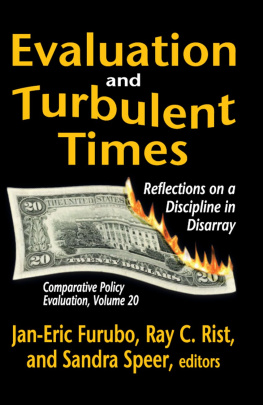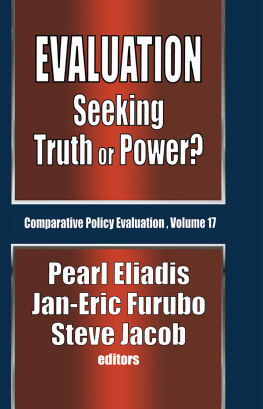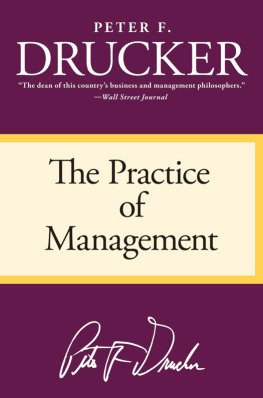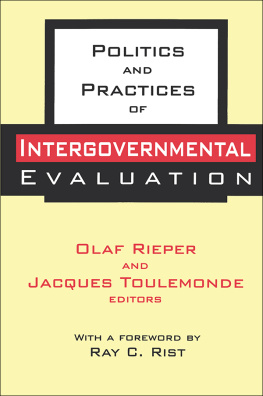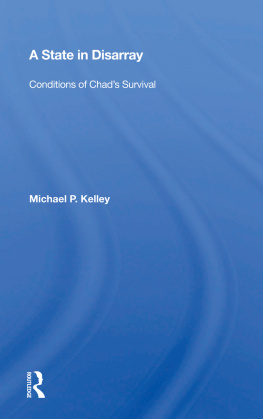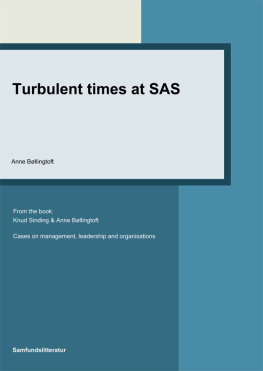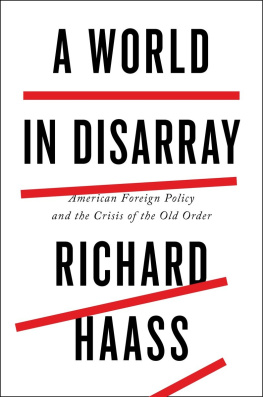Evaluation and Turbulent Times
Evaluation and Turbulent Times
Reflections on a Discipline in Disarray
Comparative Policy Evaluation, Volume 20
Jan-Eric Furubo, Ray C. Rist, and Sandra Speer , editors
First published 2013 by Transaction Publishers
Published 2017 by Routledge
2 Park Square, Milton Park, Abingdon, Oxon OX14 4RN
711 Third Avenue, New York, NY 10017, USA
Routledge is an imprint of the Taylor & Francis Group, an informa business
Copyright 2013 by Taylor & Francis.
All rights reserved. No part of this book may be reprinted or reproduced or utilised in any form or by any electronic, mechanical, or other means, now known or hereafter invented, including photocopying and recording, or in any information storage or retrieval system, without permission in writing from the publishers.
Notice:
Product or corporate names may be trademarks or registered trademarks, and are used only for identification and explanation without intent to infringe.
Library of Congress Catalog Number: 2012036965
Library of Congress Cataloging-in-Publication Data
Evaluation and turbulent times : reflections on a discipline in disarray / Jan-Eric Furubo, Ray C. Rist, and Sandra Speer, editors.
p. cm. -- (Comparative policy evaluation; v. 20)
Includes bibliographical references and index.
ISBN 978-1-4128-5174-9
1. Policy sciences--Evaluation. 2. Evaluation research (Social action programs) 3. Public administration--Decision making. I. Furubo, Jan-Eric.
II. Rist, Ray C. III. Speer, Sandra.
H97.E923 2013
320.6--dc23
2012036965
ISBN 13: 978-1-4128-5174-9 (hbk)
The editors of this volume wish to express their deep appreciation to the Rockefeller Foundation for granting us a weeks stay at The Rockefeller Foundation Bellagio Center in Bellagio, Italy. This stay surely strengthened the focus of the papers and the coherence of the book.
Contents
Jan-Eric Furubo |
Andrew Gray |
Vinod Thomas and Jiro Tominaga |
Tom Ling |
Linda Morra Imas |
Mita Marra |
Marvin Taylor-Dormond and Stoyan Tenev |
Sandra Speer |
Christian van Stolk and Mihaly Fazekas |
Frans L. Leeuw and Hans Nelen |
Jean-Franois Blanger and Steve Jacob |
Andrew O. Asibey |
Ray C. Rist
Jan-Eric Furubo
Evaluation: Adaptation or Decay in Turbulent Times
The conception of this book took place in 2009, when the international community was struck by the financial crises, and the world clearly became a very turbulent place. The authors of this book asked what impact do crises have on evaluation, and how can evaluation contribute in times of turbulence? The questions this book will deal with, can in a way, be seen as unavoidable for evaluators and evaluation theorists given the normative idea that evaluators are dedicated to using their knowledge for the benefit of society (Weiss, 2004: 153).
The past few years have seen a stream of books and articles with titles that include words such as crises, disasters, and so on. We will return to what we actually mean with many of these words. However, already at this stage, it is possible to clarify which questions can be addressed in discussing the role of evaluation in what we will broadly talk about as turbulent times. We can distinguish between at least three fundamentally different questions.
The first, and perhaps most obvious question, is how evaluation can contribute to learning about how to handle certain negative events, in other words, how we can handle what we often talk about as crises. The second is what we can learn about such events in order to prevent them or, when that is not possible, to mitigate their negative consequences. Both these questions are addressed in a booming literature about crisis management. However, we have also added a third and perhaps less obvious question, based on the assumption that some events can create a break in the existing order and make it unavoidable to replace earlier polices and institutions with new ones. An important question will, therefore, be about what role evaluation can have in times in which all that is solid melts into air, or to use a less eloquent expression than in this quotation borrowed from Marx and Engels: what roles can evaluation have in turbulent times? This last question has to be discussed in terms that we associate with the discussion that includes policy shifts, policy learning, and agenda setting.
These three questions can be seen as theoretical constructs, and the order of them can certainly be discussed. It can be argued that the very first question should concern the role of evaluation in learning how to prevent what potentially can cause a crisis. That we have chosen to start with the question of how evaluation can contribute to learning how to manage crises is a way to emphasize that when crises actually occur, the very first thing for decision makers and others involved is to handle the situation, perhaps regretting the lack of earlier actions that could have prevented a certain event or at least have mitigated its consequences. However, the urgent problems have to be handled, irrespective of whether it is about giving people shelter, about moving the population from a certain area, or about rescuing financial institutions.
We can already point out that the three questions are related to processes on different levels and can be seen in different time perspectives. In discussing how to prevent a certain event, some actions may be possible to implement more or less immediately, but we are all aware that some actions demand a different time scale. The same is true when it comes to mitigating effects of these events that cannot be prevented. Some actions can be taken more or less immediately, which also makes the line between our first two questions vague. However, some actions need several decades to be fully implemented. This is, for example, the case when it comes to changing the layout of cities and to move whole populations from some areas. It is, therefore, important to emphasize that the three questions can be divided into many sub-questions and that they also have a complex relationship to each other.
However, before going further we will say something about how we will use some key terms.
Some Key Terms
Words, such as accidents, disasters, catastrophes, and crises, are all used in everyday language without attaching more precise meaning to them. However, even if we turn to the academic literature we see, as Blanger and Jacob point out in their chapter, that they are defined differently by different authors and that the concept of crises and disaster, among others, are often used in interchangeable and concurrent ways. Blanger and Jacob add that numerous disciplines have added to the discussion, which further contributes to the fact that different meanings are attached to the concepts that are used even in academic discussions.
The reader will soon find that the chapters in this book have been inspired by different traditions, and some key terms are used differently in different chapters. This can be seen as a shortcoming, but it can also be seen as an illustration of an unavoidable diversity of perspectives in the present discussion.


